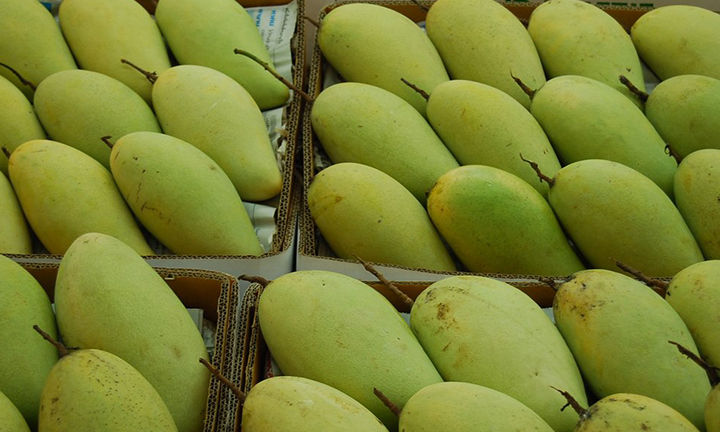SOURCE: Pakistan Observer
China-Pak mango cooperation will give impetus to king of fruit industry, according to a report published by China Economic Net (CEN) on Sunday.
There is a dire need for joint ventures with China for establishing quality enhancement centres, fruit processing units, dehydration plants, drip irrigation and cold storage chains so Pakistani fruits could be exported in line with international standards,” Ehsan Chaudhry, Senior Vice President of Pakistan China Joint Chamber of Commerce and Industry (PCJCCI) said.
From January to September 2021, Pakistan exported 37.4 tons of fresh and dried mangoes to China, which is more than 10 times the 3.6 tons in the same period in 2020. Even so, it is still less than 0.36 percent of China’s total imports of 10,500 tons of mangoes during the same period.
Facing a market with huge potential, how to increase the production of mangoes in Pakistan and let more Chinese consumers feel the charm of this “king of fruits” is undoubtedly an urgent problem for bilateral practitioners.
Commonly known as the “king of fruits” locally, Pakistani mangoes are delicacy and delight that everyone is waiting anxiously for in summer season. It has also won the hearts of people living beyond the borders due to its enticing aroma, high sweetness and fine fiber.
However, local farmers are extremely worrying about production reduction of the succulent, yellow fruit caused by various factors. According to an official of the Ministry of National Food Security and Research, Pakistan last year produced around 1.7 to 1.8 million tons of mango.
And Pakistan’s yearly mango exports amount to 150,000 metric tons, which earns around USD 90 million for 100 million to the nation annually. It is undoubtedly a good deal for Pakistan, which is in desperate need of foreign exchange reserves. Worryingly, “the production figure may be confined to 0.9 million tonnes this year, or less,” according to All Pakistan Fruit and Vegetable Exporters Association (PFVA) Patron in Chief Waheed Ahmed. So, what on earth is going on here?
Farmer’s dreams of raking in big profits were shattered by an unusual spike in temperatures coupled with water shortages and unexpected windstorms in the months of March and April. “Severe water shortages in Sindh leave us without enough water to irrigate fruit trees. And extreme weather, such as hot hurricanes, makes it hard to guard against,” Muhammad Khoso, a Mango Orchard Contractor from Hyderabad told CEN, “There are only 20 percent of mango production left in the areas with the worst reductions.” Besides, heavy windstorms in the first week of May caused major fruit-shedding.
The huge blow to Pakistani mango industry caused by water shortages and abnormal temperatures brought about by global warming is obvious. The South Asian nation is currently facing huge water shortages due to less snowfall and rains-triggering widespread protests by farmers. United Nations Convention to Combat Desertification has listed Pakistan among 23 countries facing drought emergencies.
In addition, as a light-loving tropical-subtropical plant, excessive temperature can also cause severe sunburn on mango flowers and fruits. “Unusual temperatures in March and April have wreaked havoc on mango production, causing a significant reduction in its quantity,” said Shahid Hameed Bhutta, a grower from northeastern Multan city, a big mango producing district. Temperatures soared to 38-42 degrees Celsius in March and April in Multan, at least 6 degrees higher than usual causing massive fruit-shedding.
In addition to natural factors, rising fuel, transportation, labor, and packaging costs are also poised to lower the production, thus boosting the domestic prices of mangos and affecting exports. Global warming is the common problem that farmers in China and Pakistan need to face, not only mangoes, but all crops will face the increasingly rigorous challenge of climate change in the next few years and even decades.
“Our advanced facility agriculture will be able to systematically improve the reduction of mango production in Pakistan due to extreme weather,” said Wang Yan, General Manager of Yangling Qingpita Garden Dragon fruit Demonstration Base in Shaanxi Province. “Located in an arid and semi-arid area, Yangling has similar distribution of water resources to that of Pakistan.

